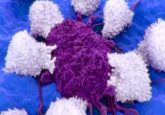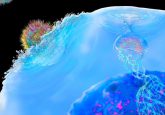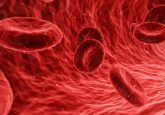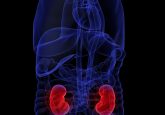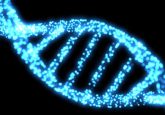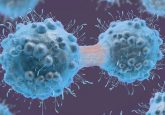ESMO16: Phase I study of novel anticancer drug identifies responders via tumor mRNA
The results from the first-in-human dose-escalation trial of the novel FGFR inhibitor, BAY 1163887, in patients with treatment-refractory locally advanced or metastatic solid tumors were presented recently at the 2016 ESMO Congress in Copenhagen (Denmark). The study used tumor mRNA to identify patients who are likely to respond to treatment.
“Most studies of FGFR inhibitors have looked at FGFR abnormalities in tumors with limited success,” commented lead author Markus Joerger (St Gallen Cancer Centre, Switzerland). “This study used an innovative biomarker approach of tumor FGFR mRNA expression.”
Conducted across six countries, the multicenter Phase I dose-escalation study was followed by expansion cohorts in patients that presented with high levels of tumor FGFR mRNA. Eighty patients were enrolled and treated in total, which included 23 patients in the dose-escalation phase and 57 patients in the expansion cohorts in bladder cancer, head and neck cancer, lung cancer and all comers.
Five doses were tested in the dose-escalation study, ranging from 50–800 mg BID, administered twice daily; BAY 1163877 has a half-life of approximately 12 hours, with the compound revealing less than dose-proportional increase in exposure when the doses are greater than 200 mg.
As there were no dose-limiting toxicities, researchers did not define a maximum tolerated dose. However, based on results from the preclinical studies, the effect on serum phosphate levels and clinical analyses, 800 mg BID has been recommended for further investigation in future studies.
In terms of toxicities, the majority of patients presented with low-grade hyperphosphatemia, an occurrence with all FGFR inhibitors. To avoid further increases in blood phosphate levels, these patients were treated with a phosphate binder as well as a reduction in the dose of BAY 1163877.
The highest activity of BAY 1163877 in the expansion cohorts was observed in the bladder cancer group, with partial remissions seen in three out of eight patients. Individual patients with squamous cell lung cancer, squamous cell carcinoma of head and neck, and adenoid cystic carcinoma were also observed to be in partial remission, with the response in the adenoid cystic carcinoma patient lasting over 1 year.
Joerger stated: “BAY 1163877 is a well-tolerated compound with an innovative biomarker approach that effectively identifies patients who have a good chance to benefit. Further studies should be conducted, particularly in bladder cancer where about 35% of patients are FGFR mRNA positive.”
Giuseppe Curigliano (European Institute of Oncology, Milan, Italy) commented: “FGFR inhibitors may provide a therapeutic opportunity to patients with rare tumors. In this patient population there were some patients with adenoid cystic carcinoma with long-term control of the disease. In the context of molecular screening programs we may offer a chance to patients with FGFR mRNA expression.”
“The toxicity profile of BAY 1163877 is better than other FGFR inhibitors under development,” Curigliano concluded. “More studies are needed to identify which patients will benefit from FGFR inhibitors – in this study; tumor FGFR mRNA expression was the best predictor of response. The next step will be to validate these results in future clinical trials.”
Source: ESMO press release
